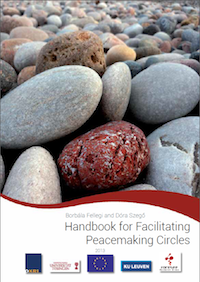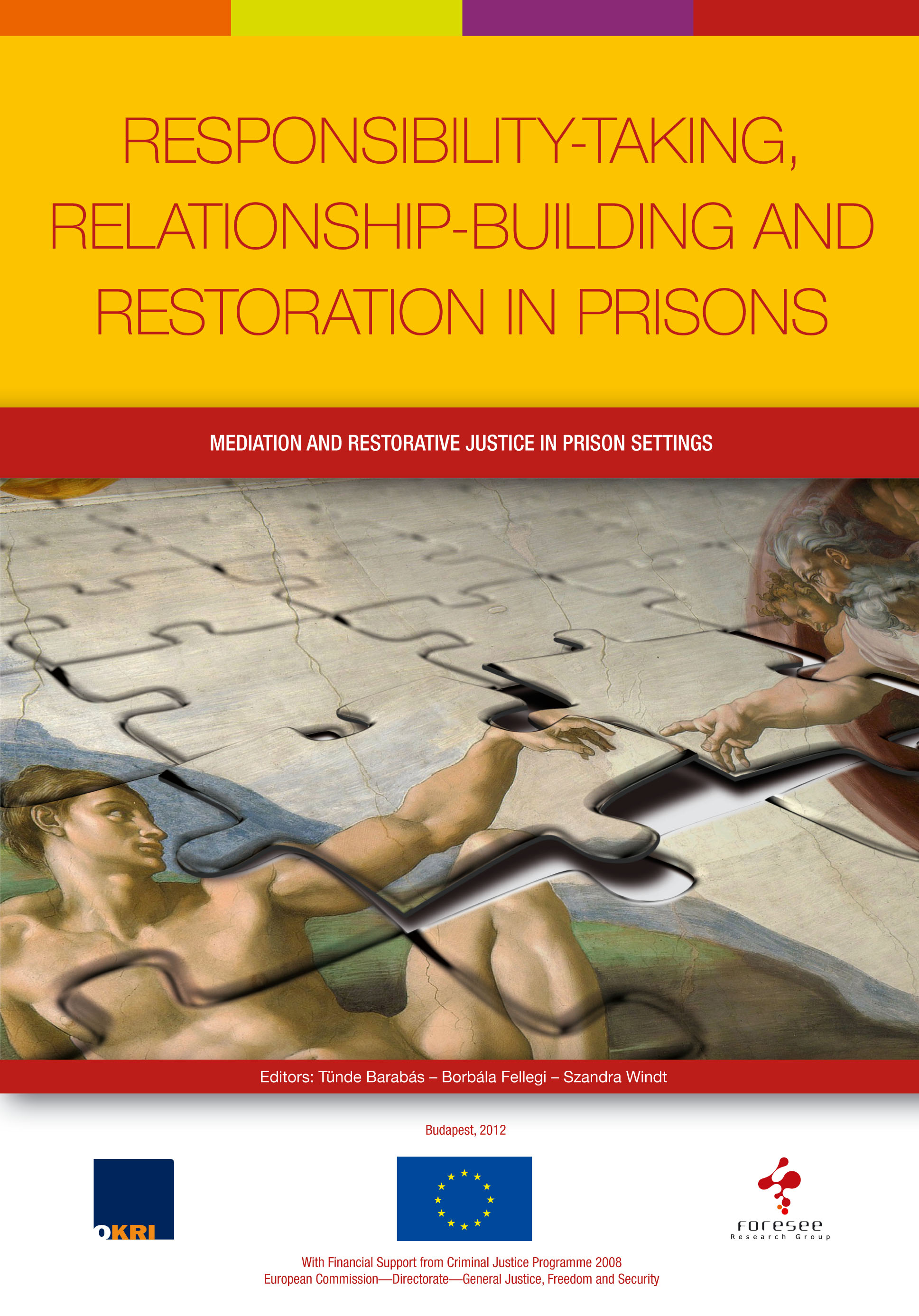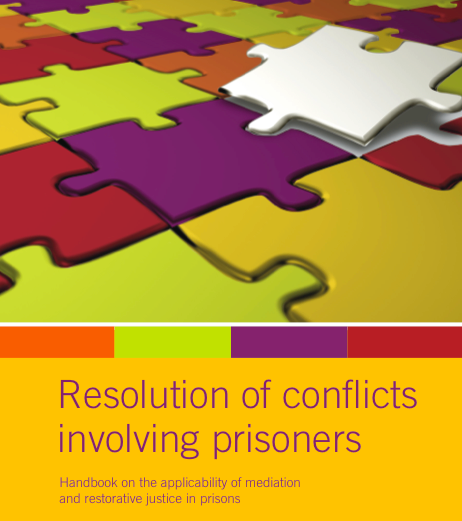
News
2012. 10. 24
|
23 prison-judges from all of Hungary’s counties participated in the training about the implementation of restorative techniques in prison settings at the Judicial Academy by Dr. Borbála fellegi, Dr. Tünde Barabás (OKRI) and Dr. Zsolt Fekete (Balassagyarmat Court). The findings of the MEREPS project played an important part in the training. The experts of the MEREPS project were responsible for the first section of the two-day long training. During the introduction moderated by Dr. Borbála Fellegi, the participants’ knowledge of the practice of restorative techniques has been measured. Following the introduction, Dr. Zsolt Fekete... |
2012. 08. 08
|
A two day-long workshop of the „Peacemaking Circles in Europe” project was organized by the National Institute of Criminology in cooperation with the Foresee Research Group in Budapest, between 29th and 30th March 2012, hosted by the Hungarian National Institute of Criminology. Why Peacemaking Circles? |
2012. 07. 15
|
The lectures introducing the basic principles, techniques, and fields of application of mediation familiarized students with new ways of conflict resolution emphasizing the community and school applicability of restorative practices. The two-week (4-15. of July 2012.) long mediation training organized in cooperation by Central European University, |
2012. 07. 15
|
As a closure for the „TEtt programme for victims and offenders” prioritized project, a two-day long professional conference has been organized at the Károlyi-Csekonics Residence in Budapest on the 31st of May and 1st of June 2012. Foresee’s executive, Dr. Borbála Fellegi held a presentation entitled „Restorative practices in the prison service” on the first day of the conference. The conference was ceremoniously opened with speeches from Dr. Róbert Répássy, Minister of State for Justice representing the Ministry of Public Administration... |
2012. 07. 15
|
Borbála Fellegi held a presentation entitled „The possibility of reconciliation and making amends in conflict resolution” on the 11th of May 2012. on the event of Szim Salom Progressive Jewish Congregation. In her presentation, Foresee’s executive introduced the fundamentals, techniques and psychology of the restorative justice approach. During the presentation, several projects and experiences of Foresee... |
2012. 07. 15
|
Borbála Fellegi participated as a trainer in the 30-hour training organized by the Penal Institue of Heves County in May 2012. The three-day-long training saw altogether 10 participants. Six of them were disciplinarians from the Penal Institue of Heves County and four came from the Balassagyarmat Prison. |
2012. 05. 06
|
The main question of the workshop – what method to use when dealing with victims – was tackled in two ways: from the point of view of research and in terms of applied mediation methods and techniques. Borbála Fellegi, Dóra Szegő, Gabriella Benedek, Eszter Posch and Zsuzsanna Z. Papp on behalf of Foresee Research Group together with experts from |
2012. 04. 26
|
The second GRUNDTVIG REDICT meeting took place in Křtiny on the 20-21 of March 2012, with the goal to work out the final outcome of the Grundtvig Project that can succesfully raise awareness and spread information about alternative conflict resolution to the public and professionals in related fields. The representatives of the partner organisations were as follows: |
2012. 04. 25
|
The book "Responsibility-taking, Relationship-building and Restoration in Prisons" (edited by BARABÁS, T. - FELLEGI, B. - WINDT, Sz.) includes the final research results and case studies about mediation and restorative justice in prisons from Hungary, the United Kingdom, Germany and Belgium. The full title of the book for references: Barabás, T. - Fellegi, B. - Windt, Sz. (eds) (2012), Responsibility-taking, Relationship-building and Restoration in Prisons, Budapest: OKRI. ISBN 978-963-89468-1-2. 330 p. This publication includes the research studies, results, observations, experiences and proposals relating to the work carried out by the participating partners over the three years of the |
2012. 04. 18
|
Foresee participates as partner in the four year-long international project funded by the European Union's 7th Framework Programme for Research and Technological Development (FP7). The project has started on 1 February and will be carried out by Belgian, Serbian, Austrian, Irish and Hungarian partners. The project aims to provide an alternative and deepened understanding based on empirical evidence of how to handle conflicts within intercultural contexts in democratic societies in order to set up security solutions for citizens and communities. |
2013. 06. 28
|
The EU funded project (JUST/2010/JPEN/AG/1609), entitled ‘How can Peacemaking Circles be implemented in countries governed by the “principle of legality?” aims to determine the potential of peacemaking circles as a European model and to test and research the implementation of this method in the justice system of three European countries: Germany, Belgium and Hungary from September 2011 until May 2013, under the leadership of the University of Tübingen.
The piloting of peacemaking circles in Hungary takes place in four counties (Békés, Szabolcs-Szatmár-Bereg, Hajdú-Bihar and Baranya) in cooperation with the local offices of justice, in the selected and eligible criminal cases. The leading partner of the Hungarian consortium is the |
2012. 03. 17
|
Borbála Fellegi presented the theory and practice of restorative methods for the postgraduate students of mediation at Pázmány Péter Science University’s Faculty of Humanities in the form of a training. The training demonstrated multiple restorative methods, the students had the opportunity to experience for example criminal mediation, the conference technique, the peacemaking circle, the methodology of community mediation and the family group decision making. |
2012. 03. 17
|
Borbála Fellegi held a course on the theory and practice of restorative procedures for the master studens of ELTE’s faculty of Education and Psychology. During the practical part of the course the students were introduced to criminal mediation, the conference method, peacemaking circles, the methodology of community mediation and also the method of family decision making groups. |
2012. 02. 09
|
The three day-long final conference of the „Mediation and Restorative Justice in Prison Settings” (MEREPS) project has been successfully carried out between 17th and 19th January 2012 by Foresee Research Group and the National Institute of Criminology. The three year long international research „Mediation and Restorative Justice in Prison Settings” (MEREPS) led by Foresee Research... |
2012. 02. 09
|
Programme of the final conference of the project ‘Mediation and Restorative Justice in Prison Settings’ Here you can find the detailed programme of the two day-long professional conference held at the Hungarian Judicial Academy. |
























